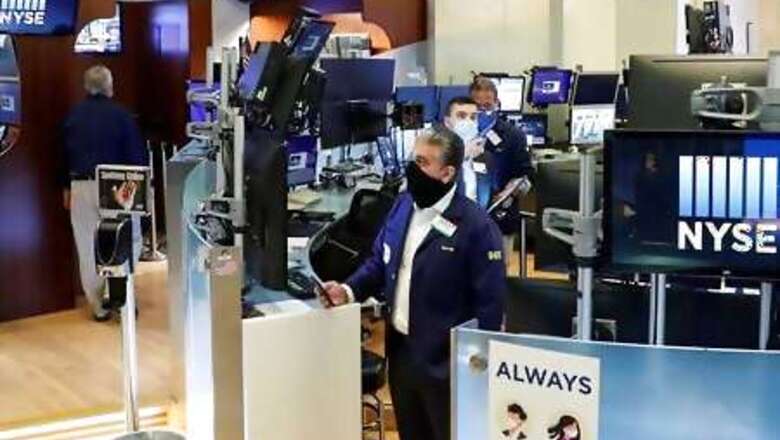
views
U.S. stocks fell on Friday as uncertainty over the government’s next coronavirus aid exacerbated economic worries related to the pandemic, countering early euphoria from stunning quarterly results by Apple, Amazon.com and Facebook.
Google-parent Alphabet Inc fell 5.1%, and was among the biggest drags on the S&P 500 and Nasdaq, as it posted the first quarterly sales dip in its 16 years as a public company.
Negotiations over coronavirus relief aid continued, but the White House and Democrats were not yet on a path toward reaching a deal, hours before the expiration of a federal unemployment benefit.
“Markets are trading as if there’s going to be an emergency stimulus or at least a stopgap measure. Otherwise we would see stocks much, much lower,” said Danielle DiMartino Booth, chief strategist of Quill Intelligence in Dallas.
“There’s a lot of enthusiasm and investors certainly want stocks to go up, but we keep getting interrupted by the reality of the bad news.”
Deaths from COVID-19 appeared to be rising at their fastest rate since early June in the United States, while the epicenter of the pandemic showed signs of shifting to the Midwest.
U.S. stocks opened higher on a boost from technology companies. Apple Inc surged as much as 7.1% to briefly take over Saudi Aramco as the world’s most valuable public company, as it delivered year-on-year revenue gains across every category and in every geography.
Amazon.com Inc jumped 3.7% after posting the biggest profit in its 26-year history, while Facebook Inc climbed 7.5% after it reported better-than-expected revenue.
A surge in the stocks of the tech titans, which make up nearly a fifth of the S&P 500’s value, and an estimated $5 trillion in asset purchases unleashed by the five biggest central banks globally have set the S&P 500 on course for its fourth straight monthly gain.
The benchmark index is now about 4% shy of its February all-time high, but faltering macroeconomic data and rising COVID-19 cases in the U.S. are making investors cautious again.
At 12:53 p.m. ET, the Dow Jones Industrial Average was down 276.53 points, or 1.05%, at 26,037.12, the S&P 500 was down 21.52 points, or 0.66%, at 3,224.70. The Nasdaq Composite was down 9.66 points, or 0.09%, at 10,578.15.
Energy stocks fell the most among the 11 major S&P sectors after Chevron Corp reported an $8.3 billion loss on asset writedowns and ExxonMobil Corp recorded a second consecutive quarterly loss.
Caterpillar Inc fell 4.1% after the bellwether for economic activity offered little signs of improvement in equipment sales.
Declining issues outnumbered advancers for a 2.76-to-1 ratio on the NYSE and a 3.57-to-1 ratio on the Nasdaq.
The S&P index recorded 25 new 52-week highs and no new low, while the Nasdaq recorded 92 new highs and 20 new lows.
Disclaimer: This post has been auto-published from an agency feed without any modifications to the text and has not been reviewed by an editor
















Comments
0 comment